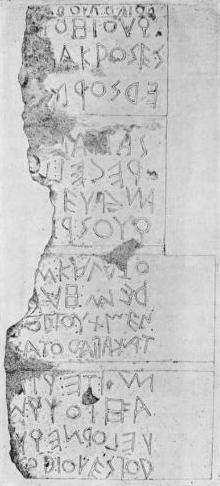Old Latin
Old Latin, also known as Early Latin or Archaic Latin, refers to the Latin language in the period before 75 BC. Old Latin differs from both the Classical Latin that followed it and the Vulgar Latin that evolved into the Romance languages. This period saw Latin transition from a local dialect of the Latium region in central Italy to the official language of the Roman Republic and the Roman Empire.
Characteristics[edit | edit source]
Old Latin exhibits many characteristics that distinguish it from Classical Latin, reflecting its development and the influences of neighboring languages such as Etruscan and Greek. Some notable features include:
- Variability in the use of endings and case declensions.
- The presence of archaic vocabulary not found in later Latin.
- Differences in syntax and grammar.
- The use of certain letters, such as the digamma, which disappeared in later Latin.
Texts and Inscriptions[edit | edit source]
The corpus of Old Latin texts and inscriptions is relatively limited. Important sources include the Twelve Tables, a codification of Roman law from the 5th century BC, and religious texts such as the Carmen Saliare. Other sources are inscriptions on monuments and pottery, which provide valuable insights into the language's early form and usage.
Evolution into Classical Latin[edit | edit source]
The transition from Old Latin to Classical Latin was gradual and involved both linguistic evolution and the standardization of the language. The work of writers such as Cicero and Caesar played a crucial role in this process, as their styles became models for later generations. The establishment of the Roman educational system, which emphasized grammar and rhetoric, also contributed to the development of a more standardized form of Latin.
Legacy[edit | edit source]
Old Latin's legacy is evident in the foundational texts of Roman culture and law, as well as in the etymology of many Modern English words. Its study provides insights into the linguistic and cultural development of ancient Rome and the evolution of Latin into the language of a vast empire.
This article is a linguistics stub. You can help WikiMD by expanding it!
Search WikiMD
Ad.Tired of being Overweight? Try W8MD's physician weight loss program.
Semaglutide (Ozempic / Wegovy and Tirzepatide (Mounjaro / Zepbound) available.
Advertise on WikiMD
|
WikiMD's Wellness Encyclopedia |
| Let Food Be Thy Medicine Medicine Thy Food - Hippocrates |
Translate this page: - East Asian
中文,
日本,
한국어,
South Asian
हिन्दी,
தமிழ்,
తెలుగు,
Urdu,
ಕನ್ನಡ,
Southeast Asian
Indonesian,
Vietnamese,
Thai,
မြန်မာဘာသာ,
বাংলা
European
español,
Deutsch,
français,
Greek,
português do Brasil,
polski,
română,
русский,
Nederlands,
norsk,
svenska,
suomi,
Italian
Middle Eastern & African
عربى,
Turkish,
Persian,
Hebrew,
Afrikaans,
isiZulu,
Kiswahili,
Other
Bulgarian,
Hungarian,
Czech,
Swedish,
മലയാളം,
मराठी,
ਪੰਜਾਬੀ,
ગુજરાતી,
Portuguese,
Ukrainian
Medical Disclaimer: WikiMD is not a substitute for professional medical advice. The information on WikiMD is provided as an information resource only, may be incorrect, outdated or misleading, and is not to be used or relied on for any diagnostic or treatment purposes. Please consult your health care provider before making any healthcare decisions or for guidance about a specific medical condition. WikiMD expressly disclaims responsibility, and shall have no liability, for any damages, loss, injury, or liability whatsoever suffered as a result of your reliance on the information contained in this site. By visiting this site you agree to the foregoing terms and conditions, which may from time to time be changed or supplemented by WikiMD. If you do not agree to the foregoing terms and conditions, you should not enter or use this site. See full disclaimer.
Credits:Most images are courtesy of Wikimedia commons, and templates, categories Wikipedia, licensed under CC BY SA or similar.
Contributors: Prab R. Tumpati, MD




